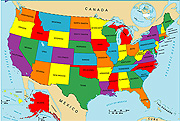- Could Artificial Sweeteners Be Aging the Brain Faster?
- Techniques for Soothing Your Nervous System
- Does the Water in Your House Smell Funny? Here’s Why
- Can a Daily Dose of Apple Cider Vinegar Actually Aid Weight Loss?
- 6 Health Beverages That Can Actually Spike Your Blood Sugar
- Treatment Options for Social Anxiety Disorder
- Understanding the Connection Between Anxiety and Depression
- How Daily Prunes Can Influence Cholesterol and Inflammation
- When to Take B12 for Better Absorption and Energy
- Epsom Salts: Health Benefits and Uses
Many U.S. Women Live Far From Gynecologic Cancer Care


Millions of American women have poor access to gynecologic cancer care, a new study finds.
The analysis showed that 36 percent of counties in the United States are more than 50 miles from the nearest doctor specializing in ovarian, uterine and cervical cancer. About 10 percent of American women — nearly 15 million — live in those counties, researchers found.
“This is the first national study to identify specific regions of the United States where residents may be at an increased risk for poor clinical outcomes — including misdiagnoses and late detection — as a result of limited access to specialized gynecologic cancer care,” said study author Dr. David Shalowitz, a fellow in the University of Pennsylvania School of Medicine’s division of gynecologic oncology, in Philadelphia.
“Based on our estimates, it’s likely that more than 7,000 women with gynecologic cancers per year experience distance-related barriers to accessing appropriate care from a specialist,” Shalowitz said in a university news release.
Increased travel time to a specialty center likely prevents many patients from being appropriately evaluated, he explained. Long distances may also decrease their likelihood of receiving the standard of care, or accessing clinical trials for ovarian, uterine and cervical cancers, he added.
Most of the counties with low access to gynecologic cancer care are in the Midwest and Mountain-West regions, but 47 states have at least one county with low access. The situation is especially bad in North Dakota, because the entire state is more than 50 miles from the nearest gynecologic oncologist, the researchers said.
Counties with the best access to gynecologic cancer care are near major cities, primarily along the Atlantic coast between Atlanta and Boston, according to the study. It was published online in the July issue of the journal Gynecologic Oncology.
The investigators also found that 15 percent of American women may have barriers to gynecologic cancer care based on their health insurance company’s referral network. The analysis revealed that 123 referral networks nationwide do not have access to a gynecologic oncologist, which means women may have to go outside their referral network to see this type of specialist.
“While we don’t yet know how access correlates to health outcomes, referral networks need to be structured in a way that alleviates the burden of travel for women in need of a specialist,” Shalowitz said.
More information
The U.S. Centers for Disease Control and Prevention has more about gynecologic cancers.
Source: HealthDay
Copyright © 2026 HealthDay. All rights reserved.










